|
|
|
Sort Order |
|
|
|
Items / Page
|
|
|
|
|
|
|
| Srl | Item |
| 1 |
ID:
190941
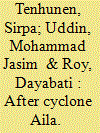

|
|
|
|
|
| Summary/Abstract |
This article compares the politics of climate change in the Sundarbans region in Bangladesh and India based on ethnographic fieldwork in four villages and among migrants from these villages in Kolkata and Khulna city by focusing on the long aftermath of cyclone Aila. The comparison highlights different policy options and framings of extreme weather events . Ten years after the cyclone, the aftermath of Aila continues in both regions we studied in Bangladesh and India, but partly for different reasons. In our study areas in Bangladesh, the aftermath of Aila reinforced the neglect of coastal livelihoods, whereas, in the communities we studied in India, Aila spurred new investments in the affected areas. By comparing how the political is interwoven with the natural, we demonstrate how Aila's lingering impacts have emerged as part of local power relationships and diverse forms of agency. We highlight the multiplicity of policy responses and people's practices not only between communities and countries facing a similar predicament but also within the communities themselves. We argue that the politics of climate change is not only about climate change policy to mitigate the impact of ecological disasters but also about the reconstruction of political agents and practices.
|
|
|
|
|
|
|
|
|
|
|
|
|
|
|
|
| 2 |
ID:
190938
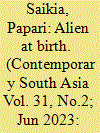

|
|
|
|
|
| Summary/Abstract |
This article investigates the relationship of a migrant community with the state in a borderland. The relationship between the Indian state and Chinese-origin migrants in post-colonial Assam can be characterised by two themes: control and resilience. On the one hand, the state tried to control the community through strict bureaucratic procedures. On the other hand, the Chinese community showed resilience by adhering to or negotiating with the control mechanisms. This article also seeks to understand the nationality and citizenship issues of community members, in particular the second and third generations of migrants. In this article, I argue that ambiguities of citizenship status, and the state’s reluctance or negligence in resolving their citizenship issues, had grave consequences for the community as they had to struggle for their fundamental rights. This issue of ambiguous citizenship caused severe unrest in the region in the later decades, which could also have been avoided.
|
|
|
|
|
|
|
|
|
|
|
|
|
|
|
|
| 3 |
ID:
190947
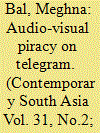

|
|
|
|
|
| Summary/Abstract |
Telegram, an encrypted digital messaging application, is an emerging hotbed for digital piracy. It has several features that make it attractive for pirates, including the ability to share large files at scale, coupled with an emphasis on privacy and security that allows for such sharing to be carried out largely anonymously. Telegram gained prominence in academic literature as a safe haven for activities in the digital realm that have increasingly found themselves subject to institutional censure. However, while most studies have delved into the matter of online video piracy on Telegram, perspectives on the economic models and revenues relied on by Telegram pirates in India remain largely unexplored. This paper proposes to discuss Telegram’s ascent as a significant medium in the Audio-Visual piracy market in India and will more specifically analyse the mechanisms of piracy monetization (payment services, and ad-revenue generators) which represent an important stake in pirates’ strategies. Finally, the paper argues that the analysis in terms of economic models represents a valuable contribution to current debates on copyright enforcement. The methodology relies on both primary and secondary sources complemented with semi-structured interviews with pirates and an entertainment industry professional.
|
|
|
|
|
|
|
|
|
|
|
|
|
|
|
|
| 4 |
ID:
190943
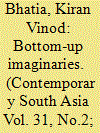

|
|
|
|
|
| Summary/Abstract |
In this article, I analyze discourses around the introduction of Intermediary Guidelines and Digital Media Code – new changes in laws regulating new media companies in India, and how these discourses inform the imaginations about the rights and duties of corporations and citizens in the country. I argue that though these guidelines were brought into effect through legal and juridical channels, they were reified through state-led and user-generated political discourse, constituting bottom-up imaginaries about the governance of social media platforms. To comprehensively analyze the impact of the guidelines regulating social media companies, this article argues for the need to examine the interlinkages between online discourse and policy regulations at three levels of operation: (a) the government’s imagination for the country’s digital future, (b) quotidian online discourse reifying the politics of regulation and (c) the dominant imagination of social media as socio-political actors responsible for upholding democracy, the freedom of speech of users, and dissent. Based on the findings and analysis, I argue that the regulation of social media platforms in India demonstrates reconfiguring relationships between social media companies, emerging forms of nationalism, and the government’s expectations of compliance from social media companies.
|
|
|
|
|
|
|
|
|
|
|
|
|
|
|
|
| 5 |
ID:
190946
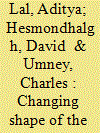

|
|
|
|
|
| Summary/Abstract |
Scholars have explored the impact of technological developments on the livelihoods of musicians before digitalisation and in the contemporary age of music streaming platforms. However, a striking gap exists with respect to the Indian music industries which have been conspicuously ignored by scholarship on cultural work. This article contributes towards addressing this gap. First, we show how platformisation is challenging the longstanding domination of Indian music by film soundtracks which relegated non-film musicians to precarious careers with unsustainable work. We show that platformisation has ushered in a new wave of non-film music that is posing unprecedented challenges to the cultural hegemony of film music. Second, we show how platformisation has also accelerated demands for copyright reform, which may benefit some musicians. However, third, we show that platformisation may well reinforce the domination of powerful local record companies, with potentially negative impacts on musicians. Fourthly, we suggest that platformisation may be disadvantaging musicians who work in languages besides the dominant ones of Hindi and English. Our concluding section suggests that platformisation brings both challenges and potential benefits for some musicians and draws out the implications for future research on the platformisation of cultural work.
|
|
|
|
|
|
|
|
|
|
|
|
|
|
|
|
| 6 |
ID:
190940
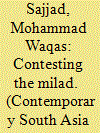

|
|
|
|
|
| Summary/Abstract |
This article examines Deobandi and Barelvi discourses on the milād, the celebration of the Prophet Muhammad’s birthday, an important marker of Barelvi identity and a primary site of contestation. It argues that milād indicates a significant development in the discourses of conflict between the ‘ulamā (religious scholars) of the two traditions as they have moved from subtle debates into categorically oppositional ones in Pakistan. This includes diverging from the opinions of ‘ulamā of the past, given the present competitive context. The milād is a site, event, and ritual in which both groups of ‘ulamā situate themselves as orthodox lovers of the Prophet, and the other as disrespectful or bidatī, bringing innovations into Islam. This also shows Islam as a discursive tradition, as both the conflict on and the practices of milād find historical precedents to justify positions in the present, while demonstrating changes in emphasis, contestations, and perceptions of self and other over time. As a result, when the Deobandi and Barelvi traditions have come to oppose and embrace the milād, in almost absolute terms in Pakistan today, they are also demonstrating subtle but significant developments in South Asian Islam over the past century.
|
|
|
|
|
|
|
|
|
|
|
|
|
|
|
|
| 7 |
ID:
190945
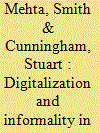

|
|
|
|
|
| Summary/Abstract |
This article analyzes the significant events that led to the emergence and growth of the online Indian audio-visual sector. The principal argument that drives this narrative is the co-evolution of Indian formal and informal media economies that led to the media industries’ digital transformation. Drawing on historical analysis of the Indian film and television industries, we argue that just as the informal means of finance, social relations, illegal cable and satellite distribution had a formative influence on how these industries formalized, the Indian online audio-visual sector is driven by distinctive formalization processes, led by creators who are engaging with both local and global UGC-led platforms as well as PGC-led portals. Using a critical media industries framework, with data gathered from semi-structured interviews with ‘above-the-line’ Indian online media practitioners together with trade press literature, we propose an analytical framework that incorporates both platforms and portals as industrial objects for mapping digital production cultures that originate as inherently informal.
|
|
|
|
|
|
|
|
|
|
|
|
|
|
|
|
| 8 |
ID:
190937
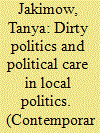

|
|
|
|
|
| Summary/Abstract |
Politics is dirty’ is a truism, a taken-for-granted reality in much of the world, particularly in India. Its implications are likewise seen as inescapable. Scholarship examining women’s political underrepresentation often cites the ‘dirty’ nature of democratic politics as a key disincentive for women to participate. While not disputing that politics is, in some respects, ‘dirty’, I question the mechanisms through which it is said to hinder women’s political representation. Drawing upon ethnographic research with female party workers and elected municipal councillors in Dehradun, North India, I analyse how ‘dirty politics’ positions women as ‘out of place’ within the political realm. While both men and women engage in acts of political care, men can more easily transgress the boundaries between them, straddling both ‘dirty politics’ and a ‘politics of care’. This production of the ‘political’ as a realm unsuitable for women or mismatched with their activities, is one factor contributing to the underrepresentation of women in politics in South Asia, and beyond.
|
|
|
|
|
|
|
|
|
|
|
|
|
|
|
|
| 9 |
ID:
190942
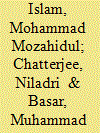

|
|
|
|
|
| Summary/Abstract |
The article explores the impact of one of the deadliest disasters in the twentieth century, the East Pakistan cyclone of 1970, also known as the Great Bhola Cyclone, on the first-ever general election held in united Pakistan immediately thereafter. It argues that the cumulative dissidence of the eastern bloc since the partition of India in 1947 had reached its crescendo and made a landfall impact following the disastrous aftermath of the cyclone, which was evidenced in the general election of December 1970, creating the very triggering effect that led to a series of political events and the bloodbath that followed, eventually culminating in the formation of an independent nation-state of Bangladesh in 1971. While doing so, the article builds on the literature on disaster and electoral politics, historical disasters, and uses hitherto underexplored sources, both official and unofficial, archives, and personal memoirs.
|
|
|
|
|
|
|
|
|
|
|
|
|
|
|
|
| 10 |
ID:
190944
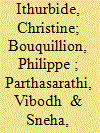

|
|
|
|
|
| Summary/Abstract |
Recent developments in digital technologies in South Asia require special attention on the restructuring of industries based on creativity, arts and culture. More specifically, powerful players from the communication industries have been at the heart of changes in the legacy creative industries. The aim of this special section is twofold. On the one hand, to critically assess transformations taking place in the industrial and policy dynamics shaping the creative industries in India; and, on the other hand, to identify the peculiarity of Indian dynamics amidst what is widely perceived as a fairly uniform set of global phenomena. Through examples focusing on audiovisual and music sectors, the contributions explore how these dynamics are deeply anchored within social and political contexts at the local, national and global scales, and how – far from its emancipatory promise – the digital often tends to reinforce uneven economic scenarios and power relations.
|
|
|
|
|
|
|
|
|
|
|
|
|
|
|
|
| 11 |
ID:
190948
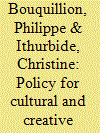

|
|
|
|
|
| Summary/Abstract |
This article examines the evolution of public policy for cultural and creative industries in the context of building India as a digital nation. How has the rise of digital industries in the building of the country permeated policies related to cultural industries, and what have been the consequences of this trend? It will also explore the tensions regarding the evolution of the role of the State in shaping and regulating such industries in the broader context of culture being increasingly associated with national identity. This article starts by showing that in a context where cultural policies remain centered on heritage, the support to culture by the state has remained limited, both in financial terms as well as regarding the implementation of specific regulations which would require protection from traditional market forces. Then, it analyzes several action plans that have been developed as part of the Digital India government initiative and assesses emerging issues for the cultural and creative industries, which are increasingly associated with the functioning of digital devices and operators. Finally, it discussed recent modalities of state intervention through the transfer of the role of cultural operator to digital platforms and the attempts to control expressions.
|
|
|
|
|
|
|
|
|
|
|
|
|
|
|
|
| 12 |
ID:
190939
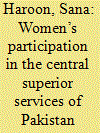

|
|
|
|
|
| Summary/Abstract |
Decentralization and efforts for inclusivity in Pakistan’s public sector from 1973 led to the recruitment and advancement of women as officers of the newly constituted Central Superior Services (CSS) of the federal government of Pakistan. Quotas for women made government more diverse and representative, and educational and length of service benchmarks for recruitment and promotion made advancement more attainable and transparent. The increasing participation of these new officers of state, outlined in this paper, can be seen as an outcome of the 1973 public sector reforms, but government policy alone is not sufficient to account for women’s entry into public life and policy making where they had been excluded from it over the previous century of the development of the bureaucracy. This paper presents professional life history narratives of 23 women officers of the CSS recorded in an oral history project in Lahore and describes the women who participated in this state project of decentralization and gender inclusivity and their motivations, complementing an historiography of administrative reform. I argue for attention to the role of families and academic institutions in enabling women in finding pathways into the CSS and advancing and succeeding in their roles, mediating between the state and Pakistani society.
|
|
|
|
|
|
|
|
|
|
|
|
|
|
|
|
|
|
|
|
|